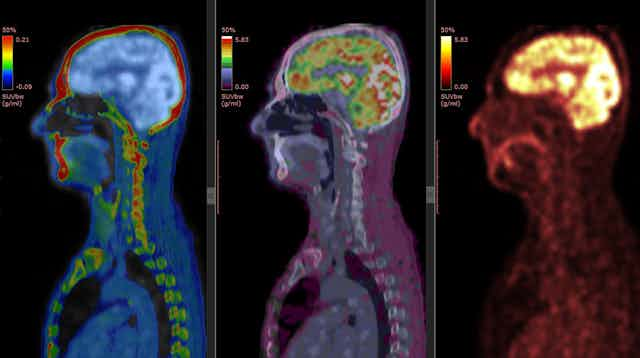With Boris Johnson as prime minister, a no-deal Brexit looks more likely. Indeed, Goldman Sachs recently raised the probability of a no-deal Brexit from 15% to 20%. Faced with an uncertain future, it is difficult to make adequate preparations for critical medicines – especially ones with a complex supply chain.
A no-deal Brexit will disrupt the supply chains that bring medicines to the UK and take goods from the UK to continental Europe. About 45m packs of medicine travel from the UK to Europe every month and the UK receives 37m packs in return. Even if a deal is reached, supply chains will continue to be disrupted long after the event.
Healthcare professionals are particularly concerned about the impact this could have on nuclear medicine. This branch of medicine mostly involves using radioactive dyes to perform diagnostic tests, which can be used to check if cancer has spread or to see how well the heart or kidneys are working. Therapies are also used to treat hyperthyroidism or thyroid cancer with radioactive iodine.
According to the British Nuclear Medicine Society, 60% of the radiopharmaceuticals the UK uses come from the EU and are used during the treatment of as many as 600,000 patients per year. These are transported mostly by road and rail across the English Channel.
Danger of delays
All medicines have expiration dates, but with radioactive pharmaceuticals there is the added problem of radioactive decay. This happens as the radioactive substance changes into one that is more stable. While this process releases the radiation needed for scans and therapies, it also means they don’t last forever.
A measure of how quickly a radioactive substance decays is its half-life. This is the time taken for the strength (or activity) of the measured radiation to decrease by half. For example, the radioactive iodine used in therapies, iodine-131, has a half-life of only eight days. After two days the strength is reduced by 15% and after eight days, by 50%.
The speed of decay means that unplanned delays of only a couple of days at a border could render the nuclear medicine unusable. The shelf life of nuclear medicines is therefore often low compared with other drugs. Extensive stockpiles simply cannot be kept, which, in any case, would require buying these medicines at a time when the pound has shrunk against the dollar and the euro.
The government has asked suppliers of nuclear medicine to use air shipments to avoid delays in case of a no-deal Brexit, but these will come at a much greater cost. And there is also the worry that the deliveries might not get through at all. Supply chain managers from the NHS and drug suppliers have to prepare for major disruption to supplies, given that there is a chance for such an eventuality.
The NHS could look for alternative sources for the radiopharmaceuticals, but ensuring these new sources meet the right standards will take time and effort. Suppliers are also not going to be helpful if the NHS seeks alternatives sources. Forget getting good deals at cheaper prices – companies will exploit Britain’s need to do a quick deal.
The UK government may also encourage drug companies to build more capacity within the UK for making nuclear medicines to shorten the supply chain. But expanding capacity would take time as the process is complex and requires radioactive material not made in the UK. The new facilities would also have to be checked to ensure they were up to standard.
Companies will still need to import raw materials, so the problem of delays does not go away. Businesses are also threatening to leave the UK in case of a no-deal Brexit. So convincing drug companies to invest in manufacturing in the UK would be a hard sell at the moment.
Dealing with industry
With none of these options being attractive, should the government or the NHS just leave it to the drug companies to provide an uninterrupted supply of nuclear medicines in case of a no-deal Brexit? In August 2018 the UK health secretary, Matt Hancock, said that he is “working with industry” to ensure a reliable supply of medical radio isotopes, but he did not outline any specific steps.
Drugs companies find it very attractive to supply the NHS, which is the largest health organisation in the world and the fifth-largest employer globally. UK-based drug company AstraZeneca told the BBC that it was increasing its drug stockpiles across Europe by about 20% “as a safety net” in preparation for a no-deal Brexit. For a global company such as AstraZeneca this means shifting more inventory from other parts of the world to the UK and Europe. Another UK-based company, GlaxoSmithKline has not committed publicly to such increases.
For UK taxpayers, the government depending on the pharamaceutical industry, either domestic or foreign, for supply of medicines is an expensive option. The NHS can use its vast purchasing power to source drugs much more cheaply than healthcare providers can in most other countries, including the US. Indeed, UK sale prices of the top 20 selling medicines are only one-third of the US equivalent.
For specialised areas such as nuclear medicine, the cost difference compared with the US is probably much more. Brexit, especially without a deal, places the NHS in a precarious position and will mean suppliers are in an advantageous position to close this price gap, driving up prices in the UK. Also, the US administration may offer a poisoned chalice in the form of a US free-trade agreement that includes the NHS, meaning higher prices like in the US.
Patients and the NHS may end up paying much higher prices for nuclear medicine, if they can get the supplies at all.

